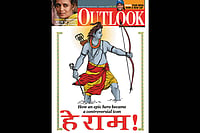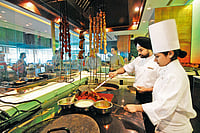Ladakh’s first lieutenant-governor Radha Krishna Mathur laid down his vision for the region, with focus on environment, tourism and primary sector, in an interview with Outlook Bureau.
What are the key industrial sectors that Ladakh will focus on in the next five years?
Every developmental project we have framed for Ladakh after the formation of the Union Territory is in sync with the vision of the Prime Minister to make Ladakh a carbon-neutral territory. This is also in tune with the wishes of people of Ladakh for an environment-friendly developmental plan.
That is why we are providing much-needed propulsion to primary sectors like handloom and handicraft, focusing on Pashmina, yak and camel wool. Cultivation of high-value agricultural products, horticulture, floriculture, dairy and fisheries, with processing of primary products such as sea buckthorn, apricot, etc. is also being given necessary boost.
An important sector is development of renewable energy, where Ladakh has potential of about 30 GW.
On the path towards carbon neutrality, what are the key areas of focus?
Carbon neutrality as a philosophy pervades every sector and decision regarding Ladakh’s development. We’ve launched the Mission Organic Development Initiative (MODI), which will play a key role in achieving carbon neutrality in agriculture. We have many projects in the pipeline with the focus on generating clean energy, utilising geothermal, hydel and solar sources while phasing out diesel generators.
In transportation, we are carrying out a pilot project of operating e-buses as part of the public transport system. In all other sectors, every decision is being made considering Ladakh’s ecosystem.
Fragile ecosystems always have to find the right balance between industrialisation and environment-friendly policies.
Industrialisation is entirely based on the principle of becoming carbon-neutral, hence the question of “finding the right balance” does not arise.
A primary-sector based development involving green technologies, is the ideal path forward. We are scaling up these sectors for better productivity. It is important to mention that Ladakh is blessed with an array of rare and high-value medicinal plants, herbs, aromatics, nutraceuticals, etc. Considering Ladakh’s small population, the right approach is to utilise these resources by involving the youth, which will make the region economically independent.
What is Ladakh’s tourism roadmap for the next five years. Where does sustainability fit in?
Ladakh is witnessing an increased tourist footfall each year. Managing this influx in a sustained manner is our top priority.
The way forward is to focus on decentralising tourism away from popular spots. Therefore, as an eco-tourism initiative, we’re developing homestays across the length and breadth of Ladakh.
We’re also working on new products such as historical and cultural tourism, regulated promotion of Buddhist circuits, silk route tourism, etc. Wildlife safaris and promotion of bird-watching are also part of our bigger plans in tourism.
The first apricot blossom festival was successfully held across Ladakh this year. We’re certain this will become a major highlight of Ladakh’s tourism.
Clear skies of Ladakh, especially Hanley in Changthang, holds great potential in astro-tourism, generating revenue without adding any carbon footprint, while also promoting virtual tourism.
In order to turn Ladakh into a round-the-year tourist destination, we are also working on winter tourism projects and have tried to provide wider promotion to activities such as food festivals like Mamani, and initiated winter sports activities like the Zanskar Winter Sports Festival.
Since Ladakh became an UT, we’ve already hosted two editions of the yearly Ladakh Winter Conclave, which has gained momentum and as a platform, facilitates productive discussions for the development of Ladakh’s tourism.
We are hoping that in years to come, Ladakh will increasingly become a prized tourist destination.


























